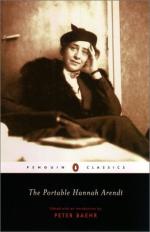|
This section contains 1,471 words (approx. 5 pages at 300 words per page) |

|
Hannah Arendt (1906–1975) was born in Hannover, Germany on October 14 to a Jewish family of Königsberg, East Prussia, Germany. She studied philosophy at Marburg, Freiberg, and Heidelberg. At Marburg she was a pupil of the philosopher Martin Heidegger (1889–1976), with whom she had an affair, and at Heidelberg she did her doctoral dissertation on love in Saint Augustine with the philosopher Karl Jaspers (1883–1969). When Hitler came to power in 1933, Arendt left Germany and for eighteen years was a "stateless person," first in Paris, where she worked with Jewish refugee groups, and then, after the outbreak of war, in the United States. From 1929 to 1937 she was married to Günther Anders (1902–1992), a journalist, philosopher, and essayist. Arendt became an American citizen in 1951 and for the rest of her life lived in New York with her second husband, the historian Heinrich Blücher (1899–1970). She died on December 14.
The Human Condition
|
This section contains 1,471 words (approx. 5 pages at 300 words per page) |

|


